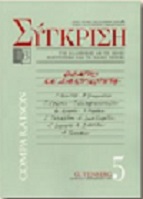Reorienting Spectator: The "Other" Theatre and the Revision of the Theatre Codexes
Abstract
In recent years social groups marginalized in terms of class, race, ethnicity, gender and sexual preference have tried, through their dynamic theatre practice, to subvert the hegemony of the white, middleclass, heterosexual male in the production and reception of spectacle. Feminist film and theatre theorists and practitioners in particular have already explored the mechanisms of the male gaze in the construction and interpretation of images (in parallel to the male construction of narrative and discourse) and experimented with new strategies which aim at destroying this exclusive inscription of male desire on the screen and the stage. Furthermore they are working towards forestalling instead a polyvocal subjective inscription in the filmic and theatrical text which would invite a similar multiplicity in audience reception.
Article Details
- How to Cite
-
Σακελλαρίδου Έ. (2017). Reorienting Spectator: The "Other" Theatre and the Revision of the Theatre Codexes. Comparison, 5, 118–130. https://doi.org/10.12681/comparison.10717
- Issue
- Vol. 5 (1993)
- Section
- Articles

This work is licensed under a Creative Commons Attribution-NonCommercial-ShareAlike 4.0 International License.
Authors who publish with this journal agree to the following terms:
- Authors retain copyright and grant the journal right of first publication with the work simultaneously licensed under a Creative Commons Attribution Non-Commercial License that allows others to share the work with an acknowledgement of the work's authorship and initial publication in this journal.
- Authors are able to enter into separate, additional contractual arrangements for the non-exclusive distribution of the journal's published version of the work (e.g. post it to an institutional repository or publish it in a book), with an acknowledgement of its initial publication in this journal.
- Authors are permitted and encouraged to post their work online (preferably in institutional repositories or on their website) prior to and during the submission process, as it can lead to productive exchanges, as well as earlier and greater citation of published work (See The Effect of Open Access).
Downloads
Download data is not yet available.



